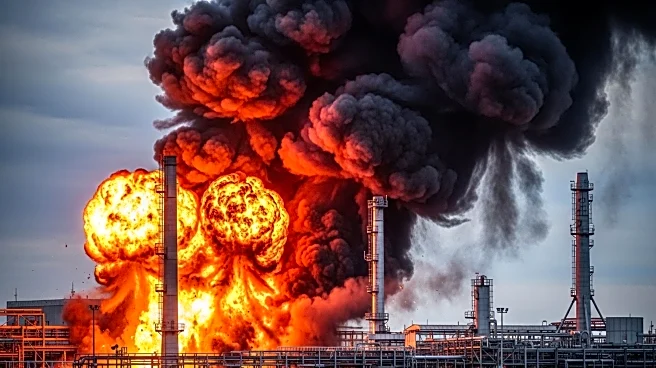What's Happening?
Ukrainian drones have struck the Kirishi oil refinery in Russia's Leningrad region, igniting a fire at one of the country's largest oil production facilities. The refinery, operated by Surgutneftegas, produces approximately 17.7 million metric tons of crude annually. This attack is part of a series of Ukrainian strikes on Russian oil infrastructure, which Ukraine claims supports Russia's military operations. The incident follows a pattern of drone warfare that has intensified since Russia's invasion of Ukraine over three years ago. The Russian Defense Ministry reported that 80 Ukrainian drones were shot down overnight across Russia, Crimea, and the Sea of Azov. The attack has exacerbated existing gasoline shortages in Russia, leading to long lines at gas stations and the implementation of rationing measures.
Why It's Important?
The drone strike on the Kirishi refinery highlights the ongoing impact of the conflict between Ukraine and Russia on global energy markets. Russia, the world's second-largest oil exporter, is experiencing gasoline shortages due to increased seasonal demand and sustained Ukrainian attacks. These shortages have led to Russia imposing a temporary ban on gasoline exports to stabilize domestic supply. The situation underscores the vulnerability of energy infrastructure in conflict zones and the broader implications for international energy security. The disruption in Russian oil production could affect global oil prices and supply chains, impacting economies reliant on Russian energy exports.
What's Next?
Russia's response to the attack includes a full ban on gasoline exports until September 30, with a partial ban extending to October 31. This measure aims to alleviate domestic shortages but may have ripple effects on international markets. The ongoing conflict and drone warfare raise concerns about potential escalation and spillover into neighboring countries, as evidenced by recent incidents involving Russian drones in Poland. Stakeholders, including NATO and European nations, are likely to monitor the situation closely, considering the geopolitical and economic ramifications.
Beyond the Headlines
The use of drones in warfare represents a shift in military tactics, emphasizing remote and precision strikes. This development raises ethical and legal questions about the conduct of war and the protection of civilian infrastructure. The conflict's impact on energy security also highlights the need for diversified energy sources and increased investment in renewable energy to mitigate reliance on vulnerable supply chains.









